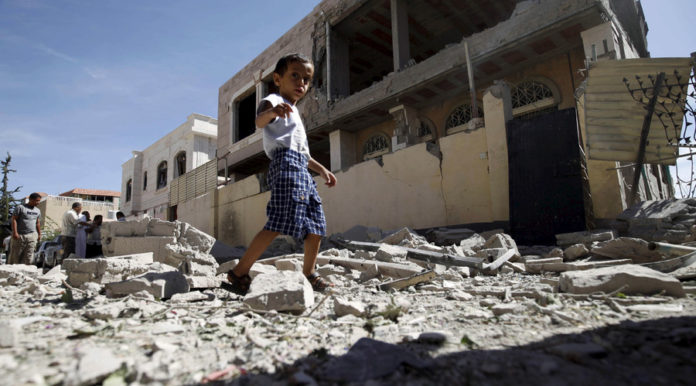
Saudi-led bombing is responsible for the majority of the civilian deaths and infrastructure devastation in the region, said the UN human rights chief, who urged the members of the UN Security Council to accelerate ceasefire efforts in war-torn Yemen.

“Failure to act decisively does not only spell misery for the millions of vulnerable people in Yemen today. It would inevitably push the country into an irreversible process of Balkanization, the consequences of which would lie outside of anyone’s control,” High Commissioner for Human Rights Zeid Ra’ad Al Hussein told the 15-member body.
Hussein rightly points out that without a ceasefire, the region would collapse into a breeding ground for radical jihadists- the same way that Syria, Iraq and Libya have turned out thanks to the intervention of other “coalitions”.
“The potential ramifications of a failed state in Yemen would almost inevitably create safe havens for radical and confessional groups such as the so-called ISIS (or ISIL, Islamic State in Syria and the Levant). This, in turn, could expand the conflict beyond Yemen’s borders, potentially shattering regional stability,” Hussein said.
The Security Council met after the UN-sponsored peace talks fell through; negotiations are set to reconvene on January 14, 2016. Fighting continues regardless of the supposed ceasefire that was imposed.
In 2012 Shia President Ali Abdullah Saleh (who had ruled for 12 years and had strong support among the Houthi) was deposed and replaced with his deputy Abedrabbo Mansour Hadi. Hadi would later be deposed by the Houthi, forcing him into exile.
In March 2015, the Saudis would strike Yemen in support of Hadi, causing widespread civilian destruction- more than 2700 civilians have been killed since March 2015, when Saudi strikes began, 600 of whom were children.
Human Rights Watch has criticized the lack of attention paid by the Security Council to the Saudi-led coalition’s strikes:
“Yet the Council has reserved virtually all of its criticism for Houthi forces, which have used indiscriminate weapons and landmines that have harmed civilians, while remaining almost silent on coalition abuses,” said Amy Herrmann, advocacy coordinator for Human Rights Watch (HRW).
“I have observed with extreme concern the continuation of heavy shelling from the ground and the air in areas with high a concentration of civilians as well as the perpetuation of the destruction of civilian infrastructure – in particular hospitals and schools – by all parties to the conflict, although a disproportionate amount appeared to be the result of airstrikes carried out by Coalition Forces,” said Hussein.
Of concern is the fact that despite (or because of) Hussein’s position against the deaths of children in Yemen, his replacement will be Mr Faisal Bin Hassan Trad, Saudi Arabia’s Ambassador at the UN in Geneva.
Sources: RT, WSJ, The Independent
This Article (UN: Saudi Strikes Cause Most Of The Civilian Destruction In Yemen, Cause Rise Of Radical Islam) is free and open source. You have permission to republish this article under a Creative Commons license with attribution to the author(CoNN) and AnonHQ.com.





600 ISIS recruits eliminated great job Saudis!!! War is hell and collateral damage is unavoidable.